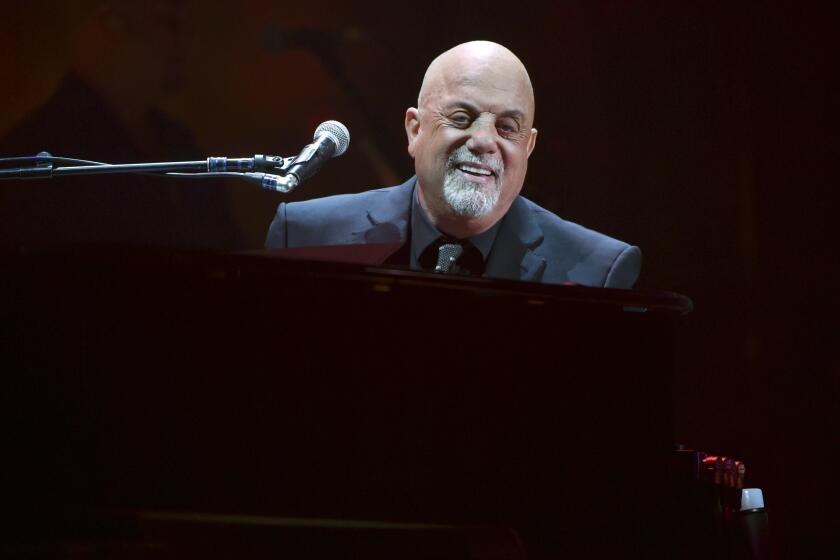Ears wide open
“WHEN I first went into the studio with John Lennon and Bruce Springsteen, I thought making records was going to be fun, like going to a Rolling Stones concert,” says Jimmy Iovine, reflecting on his route to becoming a record industry tyco4on. “But fun had nothing to do with it. Fun wasn’t even on the menu.
“Bruce would spend eight hours trying to write one line of the lyrics to ‘Jungleland’ and longer on the guitar part to ‘Thunder Road.’ He’d try it one way and then tell everybody ‘again’ and ‘again’ for days. I fell asleep for four hours one night and the first thing I heard after waking up was Bruce saying, ‘Again.’ ”
Iovine, the 53-year-old son of a Brooklyn longshoreman, is in the bright exercise room of his Holmby Hills estate, though he doesn’t look much different here, in his Nike baseball cap and sweat suit, than he does in his Santa Monica office.
As he steps onto an elliptical trainer, the slender executive isn’t just looking for a cardiovascular boost but for another hit record -- to join the ones he has had as producer or record company head with such artists as U2, Dr. Dre, Eminem, Tom Petty, 50 Cent and Gwen Stefani.
Iovine had the business smarts to build Interscope Records from a $30-million start-up in 1991 to the crown jewel in the world’s biggest music firm, Universal Music Group, but he believes his most important role is in finding and nurturing talent. He constantly draws upon lessons from his studio apprenticeships in the ‘70s.
“I’ve always wanted to bring to this record company the intensity and drive of those artists,” says Iovine, whose roster of labels also includes A&M; and Geffen Records. “Every artist can’t be Springsteen or Lennon or you’d only have two artists on your label, but you want to encourage everyone to reach for that spark of passion that I saw every day in them.
“I also learned that the songs are everything. If the songs aren’t there, you’re dead. You must do whatever it takes to get them right -- as much time, as much pain.”
Iovine brought one intangible with him to the music business: an instinct for hits, and his 35-by-30-foot exercise room is where he searches for them several mornings a week.
It was here 11 years ago that he first heard a forceful young Detroit rapper who was in L.A. seeking a record deal. An intern at the company heard Eminem live on the radio and was so impressed he got a copy of the broadcast for Iovine. He played it for premier rap producer Dr. Dre one Saturday, and Dre was so impressed he went into the studio with Eminem the following Monday. The result: worldwide sales by Eminem of 65 million albums -- or nearly $1 billion.
Last fall in the room, Iovine heard new tracks by Nelly Furtado, a young Canadian singer he inherited when Universal bought DreamWorks Records.
Iovine had tried to sign Furtado, a pop singer with teasingly seductive dance and hip-hop sensibilities, and he was fond of Furtado’s 2000 debut album and, even more, a remix track she did with hip-hop producer Timbaland.
But Iovine felt Furtado’s new music was too “mature” -- his polite word for uninspired -- and he made a mental note that morning: “Timbaland!”
Meeting with Furtado a few days later, Iovine advised the twentysomething singer to scrap the tracks she had done and go into the studio with Timbaland. Furtado jumped at the suggestion so fast it surprised Iovine, but artists do listen when you’ve got his track record.
In June, the Timbaland-produced album, “Loose,” entered the U.S. pop charts at No. 1, thanks in part to a sassy single, “Promiscuous.” Worldwide sales: more than 2.5 million.
By focusing on the music rather than chiefly on quarterly spreadsheets, Iovine fits into the grand, entrepreneurial tradition of post-World War II executives who built the modern record business -- people such as Ahmet Ertegun, Clive Davis, David Geffen, Mo Ostin and Iovine’s mentor, Doug Morris, with whom he confers six to 10 times a day.
“I don’t talk to my artists about record deals,” Iovine says. “I talk to them about how we are going to make their records better. To do that, you’ve got to infiltrate the artist and get their trust and confidence so that you can help push them in directions they might not see or might not even want to go at first, and that can cause tension, but that’s just part of the creative process.
“If you don’t speak the truth in the studio, your relationship with the artist is finished. It’s not enough to just tell them everything is great. The most important thing is to tell them when it’s not great.”
All energy, all the time
THERE’S no exercise equipment in Iovine’s fifth-floor office in Universal’s West Coast headquarters, but on a recent fall afternoon, he still seems to be in constant motion.
Even when music is blasting from the massive sound system, Iovine is multitasking, exchanging BlackBerry messages with artists or managers, or listening to staff members fill him in on the latest airplay reports.
As the music plays, Iovine points out tracks he likes and suggests improvements for others -- a better chorus, a stronger beat. It’s as if he’s got this massive computer in his head, filled with all he’s heard over the years -- and he draws sounds from it to make new recordings more appealing.
But he also keeps looking around the room for reaction to the tracks because he believes strongly that hit-making takes a team.
“A lot of record executives are solo acts,” says Iovine, his leg draped over the side of his favorite chair. “But I want everybody’s ideas. I’m talking about the people at the company, and producers and artists as well. They are all gigantic allies in setting the tone for the company. Gwen brought me the Pussycat Dolls. Eminem and his manager, Paul Rosenberg, found 50 Cent.”
As Iovine meets with his staff, he’s surrounded by some remarkable mementos. Against one wall is the mellotron that John Lennon used with the Beatles in making “Strawberry Fields Forever.” On another wall is a signed copy of Bono’s handwritten lyrics for “Sometimes You Can’t Make It on Your Own.” Iovine was with the band in Dublin, Ireland, the night U2 recorded the song about the death of Bono’s father.
These touches are more than comforting. They remind Iovine of the obsession of those artists and his own drive, so intense that Iovine (who is married and has four children, ages 12 to 18) has been taking Prozac for years to maintain balance in his life.
“Bruce said to me a few years ago that we were both lucky because we were able to keep that low self-esteem that got us here,” he says, smiling. “Some people get to where they don’t want to deal with the tough things anymore. They give it to someone else, but I’m still willing to move mountains to make things work. I haven’t earned a free pass from hard work.”
A little help from Mr. Lennon
THE Interscope co-founder isn’t the only record company chief with musical “ears” to assume his post over the last two decades, but he is by far the most successful, despite a rough start in the conglomerate age.
With co-founder Ted Field, Iovine launched the label under the Time Warner umbrella, but the media empire, upset over Interscope’s gangsta rap acts, severed ties with it in 1995. Morris, who championed Interscope at Time Warner, jumped at the chance to be in business with Interscope again at his new home, now Universal Music Group, where he is chairman. (Field left Interscope in 2001).
One of Iovine’s strengths in working with artists is that he’s endlessly entertaining, able to charm a roomful of people with one-liners about life in the music business. If you wanted to make a film about him, you’d look for a young Al Pacino type -- short and Italian, with quiet good looks.
Personality and charm surely contributed to Iovine’s swift rise in the music world. At 21, he was working as a “runner” at the Record Plant studio in New York when Lennon and engineer Roy Cicala asked him if he wanted to work with them on Lennon’s “Mind Games” album.
His enthusiasm -- and musical insight -- also played a role in a chance meeting in 1977 that changed his life. He was in the Record Plant lounge when Patti Smith walked in. Iovine was working on Springsteen’s “Darkness on the Edge of Town” and she was in another studio recording the follow-up to her brilliant debut, “Horses.”
“With Patti, I saw things in her that she didn’t even see,” Iovine says. “She wondered why her records didn’t sell more, and I told her it was because her first album showed only one side of her -- the punk/poet thing. To me, there was a lot more, a sort of mix between the street poet aura of Jim Morrison and the energy and excitement of the Rolling Stones. I thought she needed to put all sides on a record to really reach everyone with her music.”
Iovine was speaking just as a fan, so he was shocked when Smith asked him on the spot to produce her next album even though he had no experience as a producer.
He was especially thrilled to work with Smith, whose background as a poet gave her words an especially striking, adventurous edge, because he prizes lyrics above all in music; Iovine believes great lyrics speak to an artist’s depth and vision, and they’re the hardest thing to find in a new artist. But he wasn’t intimidated. He pushed Smith hard.
The moment of truth was when he realized there wasn’t a track dynamic enough to be a radio hit. His answer was for Smith to record a Springsteen song left over from the “Darkness “ sessions, a brooding tale of romantic desire titled “Because the Night.”
Smith didn’t like the idea of recording someone else’s song.
“I talked to her every night about the song,” Iovine recalls. “I’d go, ‘Patti, you’ve got to trust me. This song could be the key to getting more people interested in the album.’ I think one reason she finally gave in was that the song wasn’t finished so she was able to write the verses, and it was brilliant. I still love those lines about ‘desire is hunger, the fire I breathe, love is a banquet on which we feed.’ ”
Thanks to “Because the Night,” the Smith album, “Easter,” reached No. 20 on the national pop charts -- and the success of the album attracted other record-makers to Iovine. Among them: Tom Petty and Stevie Nicks. His separate albums with them, “Damn the Torpedoes” and “Bella Donna,” respectively, each sold millions.
For Nicks, who was making a solo album after her success with Fleetwood Mac, Iovine did more than help shape the sound or reach outside for a hit song. He didn’t know that much about Fleetwood Mac, so he listened to “Rumours” before he went into the studio with Nicks -- and he realized instantly the challenge in making a Nicks solo album.
“If you are going to make a Mick Jagger solo record, you’ve got to make sure people don’t miss the Rolling Stones. With Fleetwood Mac, you had three voices, now you are only going to have one. With Fleetwood Mac, you had three writers, now you only have one. With Fleetwood Mac, you had the musical inventiveness of Lindsey Buckingham and the comfortable feel of that rhythm section.”
Iovine’s game plan to supply those missing elements offers a revealing glimpse of what he can bring to a project. Fortunately, Nicks had lots of songs, so material wasn’t a problem. But there was a Petty song that Iovine thought would be perfect for Nicks, and he got them to agree to a duet on the song, “Stop Draggin’ My Heart Around.” He also teamed Don Henley with her on a Nicks song, “Leather and Lace.”
To add some of the musical color of Buckingham and the rest of the band, he pulled in musicians he admired, including two he remembered from his days in the studio with Springsteen and Petty -- keyboardists Roy Bittan and Benmont Tench.
“Whenever I’d work on the sound mix on Tom or Bruce’s records and find a spot in the record that needed a lift,” Iovine recalls, “I would always find myself reaching for Roy or Benmont because they were always doing something interesting.”
Over the next few years, he worked with Bob Seger, Dire Straits, Pretenders and Simple Minds. Despite the success, Iovine saw a new generation of musicians rising in the wake of the Sex Pistols and the Clash, and he felt they would want their own producers. He realized his future was in running a record company, where he could employ his talents over a wider range of musicians. He started Interscope with Field, a film producer and Democratic Party activist. Iovine was 37.
In rap’s corner
MOST major labels were slow in the ‘80s to pick up on the creative and commercial potential of rap, and Iovine doesn’t pretend today to have had a special insight into the music -- until it virtually walked in the door. John McClain, an Interscope executive, and Suge Knight, who had started the indie rap label Death Row, brought him a young record producer named Dr. Dre (real name Andre Young).
“One reason I hadn’t been that interested in hip-hop is most hip-hop records sounded cheap, tinny,” Iovine says now. “But Dre’s music sounded better on my speakers than most rock records. I didn’t know hip-hop, but I knew my speakers, and this was fantastic.”
In his first solo album, “The Chronic,” Dre made hard-core rap more accessible for mainstream radio by adding seductive R&B; and funk textures to the sound. Iovine didn’t need to give Dre direction in the studio, but he played a key role in breaking down resistance to the new style in the record industry.
When mainstream radio stations balked at “The Chronic,” Iovine and his Interscope team bought one-minute ads that just featured music from the record. They went on 50 stations and the listeners started calling, wanting to hear more. Iovine also persuaded MTV to play gangsta rap.
Iovine has since come up with a flexible game plan for working with nearly 100 artists on his labels, including U2, Beck, the Black Eyed Peas, the Game and TV on the Radio.
With some, such as self-contained rock auteurs Trent Reznor and Eminem, he pretty much stays clear of the studio. With others, including Stefani and the Pussycat Dolls, he or another member of the staff will be actively involved.
Iovine put Stefani together with artist-producer Pharrell Williams, who helped her record the culture-bending, Grammy-nominated single “Hollaback Girl” and worked with her manager, Jim Guerinot, in expanding the singer into fashion, films and a website magazine. Many critics have dismissed them, but Stefani and her band, No Doubt, have sold some 25 million albums.
A work in progress
IT’S the day before Iovine is to head to London to meet with U2 and Stefani to hear new music, and he’s on the elliptical trainer, listening to a new recording by Stefani.
As he pushes the pedals of the trainer, Iovine is asked about one of his big disappointments of recent years: the Hives.
Iovine goes into a long litany of the personal and professional roadblocks that can keep a band from reaching its potential on record. It feels like a filibuster until he cuts to the chase.
“They just didn’t come up with the songs,” he says bluntly of the last Hives album, which failed to live up to the enthusiasm the Swedish band had built on its indie releases. “They thought people were just responding to the attitude in their shows, and it was never just that. But I’m not giving up. I’ve already spoken to them, and they know what they need to do.”
Iovine pauses.
“You heard what Andre 3000 said about ‘Hey Ya,’ didn’t you?” he says finally, referring to the wacky and wonderful OutKast hit of 2003. “He said there wouldn’t have been a ‘Hey Ya’ without the Hives
Two weeks later, Iovine is back from London and a side business trip to South Korea, and he wants to talk about a different topic: the future of the record business.
“I met with Samsung, and it convinced me more than ever that the structure of the record business doesn’t work,” the label executive said, sitting on his office patio. “If we don’t fix this business, people won’t look back on us in 20 years and applaud because of all the great artists we signed. They’ll remember us as the generation that watched the music business die, and I don’t want to be part of that legacy.”
But what can anyone do in an industry whose album sales are falling faster than a bungee jumper at the county fair -- even someone who has been called the “future” of the record industry by no less an entrepreneur than Apple’s Steve Jobs?
Iovine, who learned much about positioning a company for change from Jobs, thinks there are solutions.
“Until now, the record industry has thought primarily in terms of defense -- ‘How do we stop the leak?’ ” Iovine says, referring to finding ways to combat what he brands as the “stealing” of music through file sharing, piracy and other means. “We have to get into more of the revenue stream. The eventual answer may be a flat fee that enables you to listen to all the music you want. Sites like iTunes need to become a more fulfilling experience -- besides music, they should allow you to communicate with other fans, buy concert tickets, T-shirts, maybe even get unreleased recordings by your favorite artists.”
He’s so excited about the future that he spends nearly an hour on the topic before returning to music and playing a new track that would end up on U2’s new greatest hits album.
It is near the end of a long day, but he’s energized. Iovine is looking forward to hearing lots of music that has piled up during his trip. He can’t wait to get back on the treadmill.
*
Next: Rick Rubin, the Zen-inflected record producer who has shaped hits for the Beastie Boys, the Red Hot Chili Peppers and Johnny Cash.
More to Read
The biggest entertainment stories
Get our big stories about Hollywood, film, television, music, arts, culture and more right in your inbox as soon as they publish.
You may occasionally receive promotional content from the Los Angeles Times.






